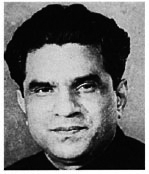- Volume 64 , Number 4
- Page: 462
R. V. Wardekar 1913-1996

Dr. R.V. Wardekar, Founder-Director of Gandhi Memorial Leprosy Foundation, passed away on 1 August 1996 at the age of 83. He had suffered a fall and was bedridden for some time. The end came suddenly.
Born on 27 October 1913 at Pune, Dr. Wardekar had his earlier education in Jodhpur and Pune. He took his medical degree (M.B.B.S.) in 1940 from Grant Medical College, Bombay. Subsequently he specialized in pathology and obtained his M.D. degree. Those were the times when there were extremely few qualified pathologists in the country. He taught pathology for a brief period and set up a private laboratory in Bombay. Although he was very successful as a teacher and a pathologist, and also had a lucrative practice, he was totally dissatisfied since temperamentally and emotionally he was made for a different type of life, a life which is more meaningful in terms of social service and spiritual emancipation. He gave up his teaching profession and private practice and came to Mahatma Gandhi at Sevagram, a village near Wardha. Gandhi appreciated Wardekar's views and aspirations and directed him to devote fully to medico-social work with his base at Wardha. He took over the small hospital at Sevagram and also the health work in the surrounding villages.
On the death of Gandhi, a memorial trust was formed and a portion of the funds was set apart for leprosy relief work since Gandhi had shown a great compassion for leprosy sufferers. Thus, the Gandhi Memorial Leprosy Foundation (GMLF) came to be established, and Dr. Wardekar was made the Director in 1952. At that time, leprosy relief work consisted mainly in establishing leprosaria and serving the patients in the asylums. Dr. Wardekar was the first person to change this purely humanitarian approach to a program of dealing with the disease as a public health problem. Sulfones had just come in, and Dr. Wardekar took a bold step in a new direction to control the disease by chemotherapy. A system of health education, case detection and domiciliary treatment was started as a trial in 13 centers in different parts of India.
The effectiveness and feasibility of this SET pattern was soon recognized by the health authorities of the government of India, and it was adopted as the national policy for leprosy control. Soon the World Health Organization (WHO) also accepted the method, and it became the global strategy of leprosy control which has now evolved to the possibility of leprosy elimination and eradication. The other activities in which the GMLF took the lead was in conducting systematic house-to-house surveys, training paramedical workers and doctors, preparing health educators and health education material and all the other needs of the control program. It is, therefore, to be recorded that the origin of the present method of leprosy control goes to the credit of Dr. Wardekar. I had the privilege of executing the plans and projects prepared by him. The challenge was to find ways and methods in the then purely unchartered field.
Dr. Wardekar took a major role in the Indian National Leprosy Eradication Programme. He was a prominent member of all the expert committees of the government of India and the Indian Council of Medical Research. He also served as short-time consultant to WHO. He was honored by the government of India with the title of "Padmashree," and was a recipient of the International Gandhi Award.
Dr. Wardekar went into recluse in 1973 and applied himself solely to the study of scriptures, which he always desired. He is survived by his wife, Dr. Pramila Wardekar, who has been his constant guiding companion.
- K. V. Desikan